Board games with more sequels than The Land Before Time
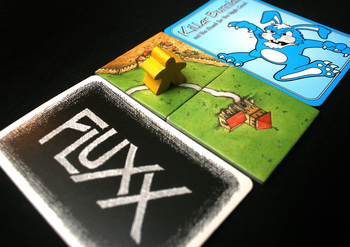
Mike Hulsebus | Contributor
There's a joke about the board game industry: the only way to end up with a small fortune from making board games is to start out with a large fortune. So it makes sense that when a board game publisher has a wildly successful hit, they try to release as many additions expansions and iterations as they possibly can, whether the game needs it or not. Why buy new games when you can pay for the same game a second time?
Today we're going to briefly look at three popular games with many spinoffs, Fluxx, Killer Bunnies and Carcassonne.
I only want to talk about Carcassonne briefly. Carcassonne is a really fun tile-laying game in which players draw tiles at random and add them to the table in a way that the fit in with the features of the landscape of the already placed tiles. If you're reading this column, you've probably already played the game, but if you haven't, it's definitely worth your time to give it a try: it's easy to pick up and is a great gateway game to bring people into non-traditional board games.
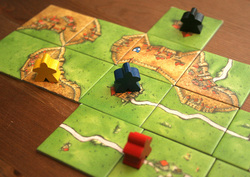
I know what you're thinking: how can we add more siege weaponry to this photo?
Mike Hulsebus | Contributor
The reason I want to talk about Carcassonne is that it has about 16 different expansions and multiple spinoff games. Recent expansions have taken the game from a contest of who can best place their tiles to a game of who can best use tabletop wooden catapults to fling their pieces onto the right space. Allow me to quote directly from the rulebook: “Whenever a player draws a landscape tile with the fair symbol, the player completes his normal turn and, afterwards, the game is interrupted for a catapult round. The active player (who drew the token), chooses one of his catapult tokens. He then hurls the token using the catapult.”
It's like playing a game of chess and, randomly on turn eight, you make paper airplanes and see who can kill the other player's pieces from 30 feet away before resuming play. One of the catapult options doesn't even interact with the game: players score five points if they can catch a token launched at them. I'll gladly take the time to play a game of Carcassonne, but I really don't feel like playing with too many expansions is worth my time since it makes the game take so much longer. Sure, you could play Uno where everyone starts out with a hand of 40 cards, but that doesn't mean that you should.
Another gaming endeavor I can't say that I recommend is Killer Bunnies and the Quest for the Magic Carrot. The base game has eight expansions that serve only really to give you a unneccessaily giant deck of cards to draw from.
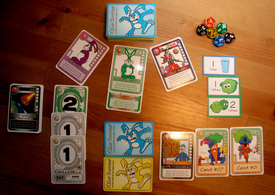
Each player will have quite a few cards on his side of the bunny circle, and many have their own special rules.
Mike Hulsebus | Contributor
The game itself isn't bad; it's just that it asks too long of a time commitment of its players for what it is. I'll avoid taking you through the entire game rules, but know that who wins the game is completely random. Players spend the entirety of the game playing cards to collect as many of the twelve carrots as they can. After all the carrots have been bought, which carrot is the winning carrot is determined completely randomly. It doesn't matter if you got all but one carrot, there is still a chance that you lost.
I recently replayed this game with friends and we came to the consensus that it was too random, too long (about 45 minutes) and too complicated for what it was.
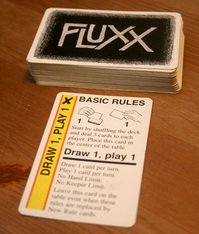
Draw a hand of three cards. Rules: Draw one, play one. You're ready to go.
Mike Hulsebus | Contributor
I don't mind a random, simple card game occasionally and that's why I keep Fluxx around, a game that takes about 10 minutes to play. The rules of Fluxx are pretty simple. The game starts with one basic rules card in play: Draw one, Play one. The cards that players will play have four basic types:
Keepers: Cards you play that stay in front of you.
Actions: Cards that have an effect like letting you take other player's keepers or draw and use extra cards
Rules: Cards that change what players do in a turn. When a player plays a new rule card, it might change it so now players draw thre cards each turn or allow whoever has a certain Keeper to draw extra cards each turn.
Goal: Cards that set winning conditions.
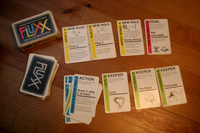
Mike Hulsebus | Contributor
Yes, even the goal of the game isn't determined until someone plays one. Goals typically require players to have the right combination of Keepers in front of them (e.g. having The Brain in front of them while no other player at the table has a Television in front of them).
So yes, the game can suddenly end if you happen to draw the right card that completes your goal. No, there isn't much strategy to Fluxx, but Fluxx is a great game when you're looking to have fun and kill some time playing a quick game.
While Fluxx doesn't have a lot of expansions like the other two games we looked at today, they have put out many different packages to appeal to different markets including Fluxx, Family Fluxx, Martian Fluxx, Zombie Fluxx, Eco Fluxx, Monty Python Fluxx and even Stoner Fluxx.
There are some games that need expansions, but when it comes to Fluxx and Carcasonne, they're fine how they are.
If you came here expecting a review of Arkham Horror, Mike can't believe you read his column that closely. He moved it to next week, and until then you can collect your internet-based high five by emailing mikehulsebus@gmail.com.

